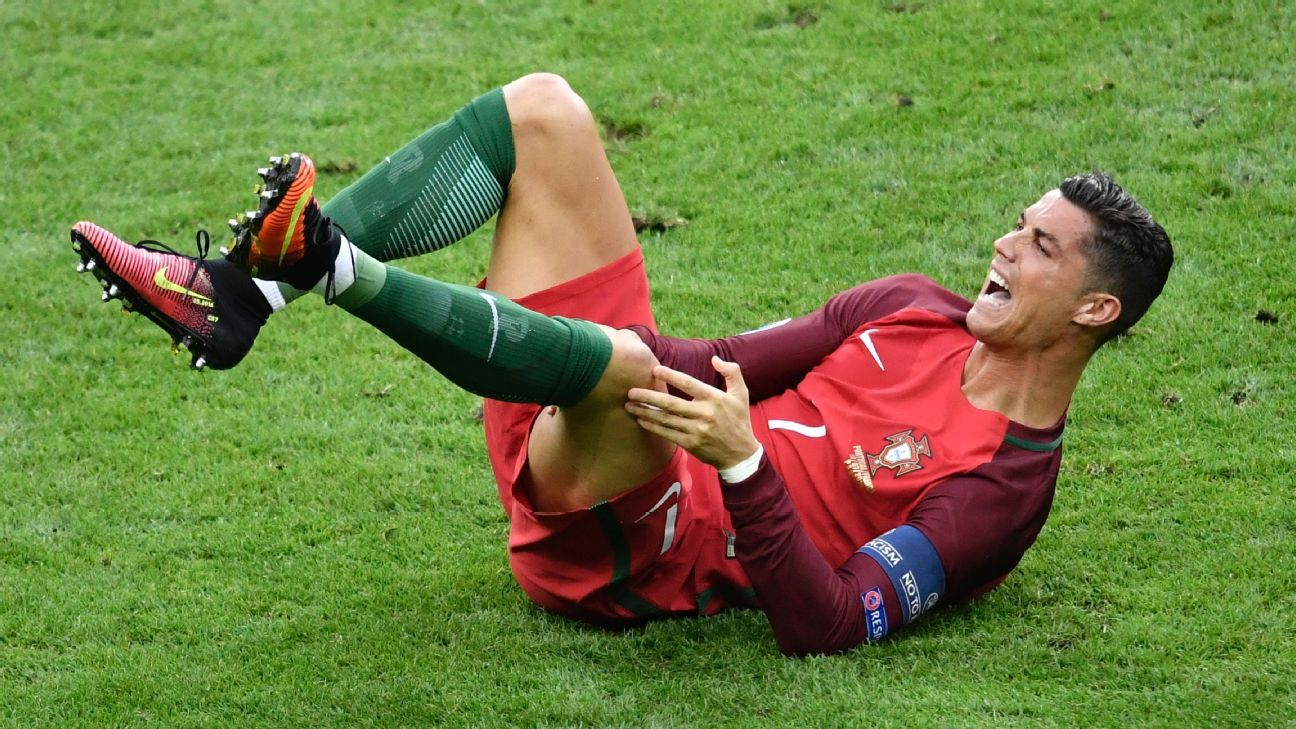In 2014, Cristiano Ronaldo faced a critical juncture in his illustrious career. Despite a recent knee injury, he made the courageous decision to continue playing for his team, Real Madrid, and Portugal. This decision, while risky, showcased Ronaldo’s dedication, resilience, and commitment to his sport, leaving a lasting impact on his legacy.

The Knee Injury
Nature of the Injury:
- Tendinosis: Ronaldo was diagnosed with patellar tendinosis, a condition causing pain and inflammation in the knee. This injury can be debilitating and requires careful management and recovery.
- Impact on Performance: The injury significantly affected his performance and posed a risk to his long-term career. Playing through such an injury could lead to further complications and potentially career-ending damage.
Timeline and Recovery:
- Initial Treatment: Ronaldo underwent extensive treatment and rehabilitation to manage the injury. The timeline for recovery from tendinosis can vary, and rushing back to play can hinder healing.
- Return to Play: Despite medical advice recommending caution, Ronaldo chose to return to the pitch earlier than expected, driven by his commitment to his team and national squad.

The Decision to Continue Playing
Pressure and Expectations:
- Club Responsibilities: At Real Madrid, Ronaldo was a key player, and his absence would have significantly impacted the team’s performance in crucial matches, including the UEFA Champions League and La Liga.
- National Duty: As Portugal’s captain and star player, Ronaldo felt a deep sense of duty to lead his country, especially with the FIFA World Cup on the horizon.
Personal Determination:
- Competitive Spirit: Known for his relentless drive and competitive nature, Ronaldo was determined to contribute to his team’s success despite the physical challenges.
- Mental Toughness: His decision highlighted his mental toughness and willingness to endure pain for the sake of his team’s ambitions.
Impact and Consequences
Short-Term Success:
- Champions League Triumph: Ronaldo played a pivotal role in Real Madrid’s 2013-2014 Champions League campaign, culminating in their victory in the final against Atlético Madrid. His performance in this period was instrumental in securing the coveted La Decima, Real Madrid’s tenth European Cup.
- World Cup Campaign: Although Portugal’s World Cup run in 2014 was short-lived, Ronaldo’s participation and effort were a testament to his leadership and dedication to his national team.

Long-Term Implications:
- Health Risks: Continuing to play with a knee injury posed significant risks to Ronaldo’s long-term health and career longevity. There was a real danger of exacerbating the injury, which could have led to more severe damage.
- Career Longevity: Despite the risks, Ronaldo’s careful management and exceptional physical conditioning allowed him to recover and continue playing at the highest level, extending his career and maintaining his status as one of the world’s best players.
Legacy and Lessons
Legacy of Resilience:
- Inspiring Example: Ronaldo’s decision to play through injury has become a part of his legacy, showcasing his resilience, determination, and unyielding spirit. It serves as an inspiring example for athletes facing similar challenges.
- Commitment to Team: His actions underscored the importance of commitment to one’s team and country, even at personal risk. This selflessness and dedication have endeared him to fans and teammates alike.
Lessons for Athletes:
- Balancing Risk and Reward: Ronaldo’s experience highlights the need for athletes to balance the desire to compete with the necessity of safeguarding their health. Proper injury management and listening to medical advice are crucial for long-term success.
- Mental Fortitude: His story emphasizes the importance of mental fortitude and the ability to overcome adversity. Ronaldo’s mindset and perseverance are key factors in his continued success and longevity in the sport.
Conclusion
Cristiano Ronaldo’s decision to continue playing for Real Madrid and Portugal in 2014, despite his knee injury, exemplifies his extraordinary dedication and resilience. While the risk to his career was significant, his commitment to his team and unwavering competitive spirit allowed him to overcome this challenge. Ronaldo’s actions not only contributed to his team’s success but also solidified his legacy as one of football’s greatest players.





